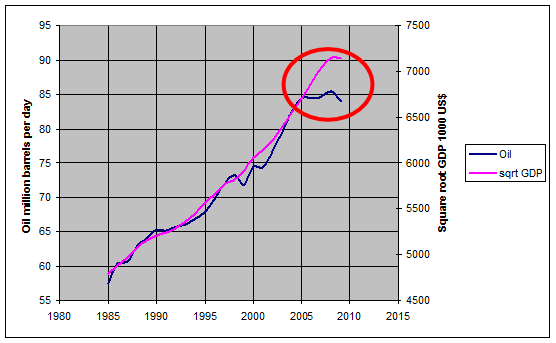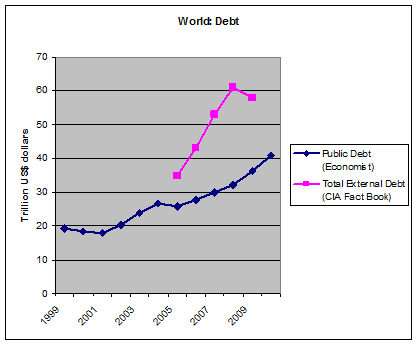Throughout the last few months of my research into the implications of an energy crisis on Higher Education, one of my main weaknesses was knowing where to start when considering the impact that a Peak Oil energy crisis would have on our economy and therefore on the economic input and output of the HE sector. When considering an energy crisis scenario in the context of Higher Education, it seems to me that we can broadly divide the impacts into 1) Economic; and 2) Infrastructural. By this, I mean that we should be asking ourselves questions that relate to how we operate in an economy with significantly declining GDP and how we operate under circumstances where our energy infrastructure itself declines (both transport and coal and gas dependent electricity are, in a sense, underwritten by oil production). ((There is also the problem in the UK that many of our power stations need to be decommissioned around 2016. See this and this.)) Simply put, what happens to universities when there is a lot less money in the economy and energy in the form of electricity and petrol is rationed in one way or another? This was my original question and, I think, still remains valid.
I think that Educational Technologists should be thinking hard about the second part of the question, which implies that the provision of educational technology will be disrupted for decades. What is HE’s educational provision under a scenario of disrupted ICT?
The first part of the question should be of wider interest to people working in the HE sector (in fact, people in all parts of society, but this is where we work so let’s concentrate on HE). There has been some useful research done on the possible economic impact of Peak Oil. It cannot be conclusive, but it does provide us with the basis for our scenario planning. I would recommend these two recent papers which examine the likely short-term (i.e. 20 yrs) economic and social consequences of Peak Oil.
Hirsch, Robert L., 2008. “Mitigation of maximum world oil production: Shortage scenarios,” Energy Policy, Volume 36, Issue 2, Pages 881-889
Jörg Friedrichs, 2010. “Global energy crunch: How different parts of the world would react to a peak oil scenario,” Energy Policy, Volume 38, Issue 8, Pages 4562-4569
In summary, Hirsch’s paper shows that we can work on the assumption that global GDP will decline at about the same rate as global oil production, which is anticipated to be around %2-5/yr. The minority of oil exporting countries will fare better than the greater number of oil importing countries. Friedrichs’ paper, based on an analysis of historical examples, suggests that this will result in North America resorting to greater military coercion until a crippled economy forces the administration into ‘coercive diplomacy’. Western Europe, reluctant to engage in ‘predatory militarism’, “could hardly avoid a transition to a more community-based lifestyle. Despite the present affluence of Western European societies (or precisely because of it), this would be extremely painful and last for several generations.”
These papers, and their references, provide a good starting point for modelling the economic and social impacts on all aspects of society, including the UK Higher Education sector: Less money, more re-localisation.
On a related note, here are a few graphs which nicely illustrate the correlation between oil, money and debt. What they suggest is that oil production closely correlates with GDP and that since oil production plateaued in 2005, debt has been the driver of GDP where oil has been lacking.
The debt information is pretty suggestive of what is going on, and that is, the reason the world has been able to keep increasing GDP since 2005 is because it has been borrowing from the future to fund the addiction to economic growth. But this situation cannot continue without serious problems in terms of repayment. And we have imminent peak oil, with the consensus dawning that soon after 2011 oil supply is highly likely to start declining with decline rates anywhere between 2% and 8% per annum. ((I am Perplexed: Comments on the World Financial Situation and Peak Oil))


